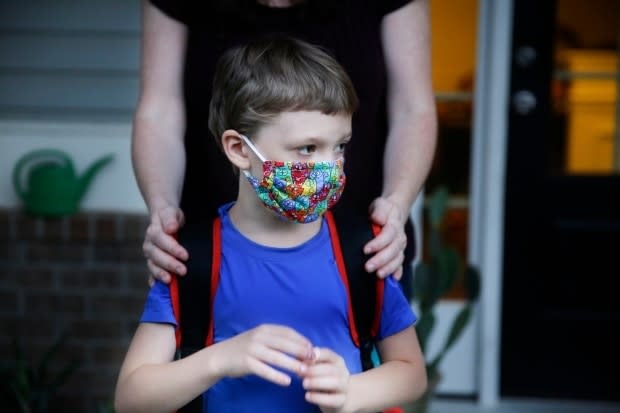From mandatory masks to getting info in Indigenous languages, N.W.T. doctors answer COVID-19 questions
From blanket mandatory mask policies in the N.W.T., to how information can be found in Indigenous languages, the territory's top doctors answered residents' questions Thursday.
N.W.T. Chief Public Health Officer Dr. Kami Kandola and territorial medical director Dr. Sarah Cook took your questions live Thursday morning on CBC's The Trailbraker with host Loren McGinnis.
Since our last call-in show, the government announced it would start regular surveillance of wastewater in some communities within the territory to identify the presence — or absence — of the coronavirus.
The N.W.T. also extended its public health emergency for the 13th time Tuesday. And on Wednesday, the territory announced it can process up to 240 COVID-19 tests per week in the territory, where before, the testing was limited to select, high-priority cases.
Cook says the capacity is expected to increase in the coming weeks as more machines come on board.
Kandola says there's an overall trend across the country that the N.W.T. is keeping an eye on — an upward "creep" in the number of confirmed cases.
Here are some of your questions:
Will there be a blanket policy on masks in N.W.T.?
Kandola says at this time, a blanket policy on mandatory masks is not warranted at this time. Instead, she says businesses and organizations have to look at their own risk assessments and develop their own policies on masks and use of personal protective equipment.
"In situations when people cannot safely distance six feet … we've always recommended that they wear non-medical masks," Kandola said.
"Employers have to do risk assessments for their own staff."
Kandola says some jurisdictions in Canada that have mandated mask-use indoors are places where there's "significant" community transmission of COVID-19.
"To institute a mandatory mask in the absence of widespread community transmission is too premature," she said.
She said if there is an outbreak in a small community there could be policies, such as mandatory masking, put in place, but the rules would be specific to that community.
Cook also says when it comes to masks in hospitals, it's mandatory for visitors and staff but not patients, including women in labour.
Cooks added that, while it's important that patients are supported, not too many people should visit; that's why there are still some restrictions for how many people can accompany a patient.
Why are there discrepancies when it comes to people in isolation?
Two questions related to isolation. The first asked why people in isolation are at the same hotel as regular guests.
Kandola says because there is limited hotel space in some smaller communities in the N.W.T., sharing the space is necessary for hotels to maintain their operations.
However, she says there are isolation protocols in the hotels, and guests in isolation are expected to wear masks and to limit both their activity and their exposure to other guests.
"The hotels themselves still have to operate as normal," Kandola said. "It's going to be very difficult to have one dedicated hotel for people isolating and for that hotel to continue their business."

The other asked why government workers are still working from home when students and staff are going back to school.
Kandola says the N.W.T. government is "actively" working on returning staff back to work, though in some cases, people continue to work remotely due to the maximum capacity in some offices.
She added that others need to work from home if they are higher risk or living with higher risk people.
How is information being relayed in Indigenous languages?
"There's been concerted activity to produce COVID-19 material in all the traditional languages," Kandola said, including materials developed for small community radios.
Cook added that in some communities they are taking on their own initiatives, like Fort Good Hope for example, where local health care workers are working with translators a few times a week to get the message out in the local language.
When it comes to Halloween plans, Kandola says the territory is working on a policy and will have it available in October, however right now, the focus is still on a safe school re-entry.
As of Wednesday, according to the government's latest numbers, the territory had completed 4,382 COVID-19 tests and had 210 results pending. There have been five confirmed cases of COVID-19 in the territory, all of which recovered months ago.
Missed the live call-in show? Watch it here:

